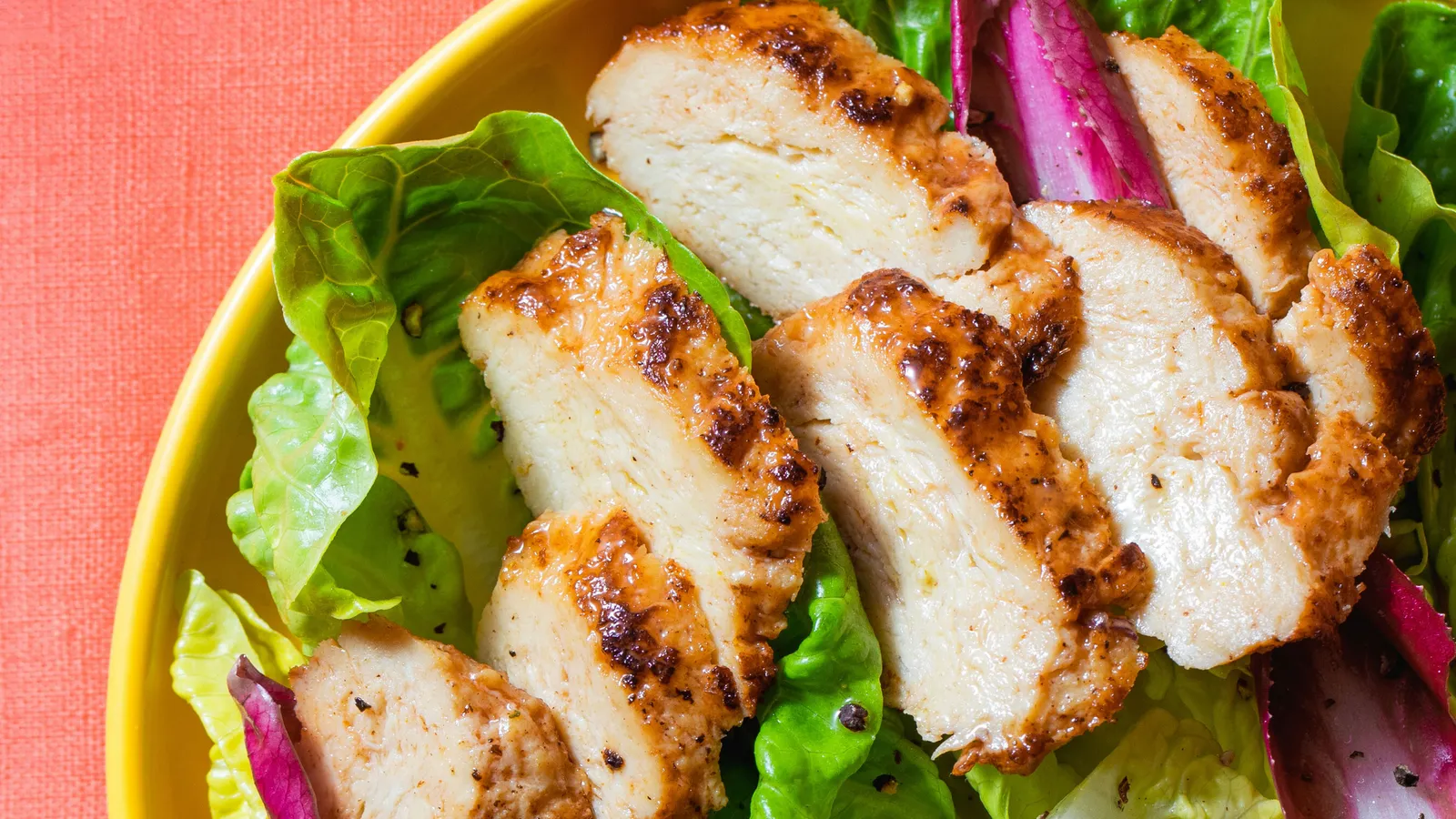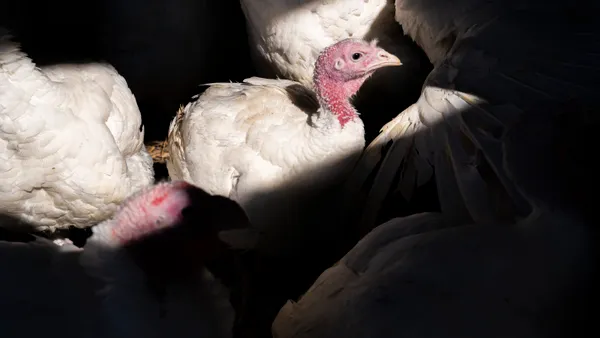This is part of a new series at sister publication Food Dive highlighting iconoclasts who challenge the status quo in the food industry. This interview has been edited for clarity and brevity.
Name: Uma Valeti
Where do you live? San Francisco, CA
Occupation: Founder & CEO, Upside Foods
Growing meat, poultry and seafood out of cells is no longer a pipedream, it’s a reality and Dr. Uma Valeti’s Upside Foods is leading the charge.
In the autumn of 2022 the company obtained FDA approval for its cultivated chicken—the company’s first rollout—and in June, the USDA gave its final approval, enabling Upside Foods (as well as Eat Just) to sell its cultivated chicken in the U.S. (Dominique Crenn is serving Upside Foods’ chicken at Bar Crenn in San Francisco, and José Andrés is serving Eat Just’s Good Meat chicken at China Chilcano in Washington, D.C.)
Fueled by billionaire investors including Richard Branson and Bill Gates, Upside Foods was founded by cardiologist Valeti in 2016 as Memphis Meats and was one of the first in the cultivated meat space. Moving from medicine to manufactured meat may not be an obvious career move, but Dr. Valeti sees it along the same continuum.
“I’m able to save many more lives than I would if I continued practicing as a cardiologist—like multiple magnitudes more,” he says. The opportunity, and the potential was really hard to ignore and kept thinking somebody else could do it or would do it—and I tried to encourage a lot of people to do it.”
“But I couldn't get anyone else to quit their very promising career and take a chance on something that was still in the realm of science fiction. I didn't want to look back 20 years from now and say, ‘Hey, I should have done it.’”
Valeti has come a long way from rural India, where he grew up, to the sleek modern cultivated meat production facility in the Bay Area that functions like a well-funded tech startup rather than the typical slaughterhouse. When Valeti first started thinking about cultivating meat, he remembers. “Nobody was willing to quit their very promising career to take a chance on something that was in the realm of science fiction,” Dr. Valeti laughed. So, in the absence of anyone else willing to take a chance, Dr. Valeti took the leap. “I didn't want to look back 20 years from now, 30 years from now, saying, ‘Hey, I should have done that. . . . ‘

FOOD DIVE: What was your first job?
DR. UMA VALETI: My parents come from a very humble background; we were a farming family. My mom was the first person in her family who went to college, to learn physics and graduate. We built our own home from the ground up—laying that foundation brick by brick.
I remember sitting next to the mason and laying bricks alongside him—building our own home. I didn't get paid for it. But that was my first job. And then I helped build my mom's sister's house—but this is when I was eight or ten years old.
Technically, that's what it was, but the first job I got paid for was in Jamaica when I finished medical school. It was part of my internship, and I got paid for that.
FOOD DIVE: What inspired you to focus on your current work?
VALETI: The core inspiration is that we can do better with how foods come to the table. I love being a physician, but to be able to provide an opportunity to have a lower impact on the environment and also be able to make foods healthier than they are right now.
There are three important reasons.One is kindness to fellow life.
Number two is the opportunity to decrease the enormous and unquestionable environmental impact from growing animals. It's one of the most unaddressed impacts, because there's also water pollution and air pollution. And there are significant challenges related to pandemic evolution and epidemics—[meat farming] is an existential threat to humanity with the way we raise animals.
And then the third one is what if we can make meat healthier? No one's asked this question before. We kind of take it for granted that it's the healthiest it can be, but we think it can be much healthier.
Those three things are such a powerful draw that I was able to walk away from my position and the profession I love—cardiology. It's literally at the front lines, saving lives of patients that are in cardiac arrest or heart attacks.
FOOD DIVE: What is the biggest change you have seen while working your current role?
VALETI: The most important thing I’ve seen over the last seven years is the opening of minds and opening of hearts.
Just a few years ago, people said you would never get regulatory approval in the United States and now we have. The two biggest agencies in the world have given regulatory approval for safety to move ahead.
Traveling from science fiction to reality happens very quickly.
FOOD DIVE: What was harder than you thought it would be? What was easier?
VALETI: Building Upside Foods from the ground up has been the hardest thing.
Getting into medical school was extremely hard and doing all the long hours of training as a cardiologist was extremely hard. This is at a different level. So it's not been easy, but the parts that were easier than I thought was how people—once their minds are opened up—become supporters, because the cause and the purpose resonates with them so much
But in terms of hurdles . . . there were lots of hurdles—what would we taste like? Would it taste like meat? The answer was unknown. It took a while for us to show that yes, it can. Getting regulatory approval is supposed to be an extremely hard thing, and it was a very hard thing until we got it. That was a difficult journey.
Raising funds was one of the hardest things I've ever seen, because this field did not exist before. And there was nothing to compare it with and getting some of the most seasoned, most experienced investors behind it was extremely hard to do, because obviously, they could have put this money somewhere else to get better returns. But they chose to put it in a place of significant uncertainty and risk. And they still did it. The first 100 people I spoke to were not willing to invest in this deal.
The part that was easier than I thought was how people—once their minds are opened up—become supporters. The cause and the purpose resonates with them so much. I didn’t realize how much it would resonate with hardcore meat eaters. If they can really get meat with no downside of slaughtering an animal, they’re in. That’s the part I didn’t predict.
FOOD DIVE: What is a misconception that people have about you when they first meet you?
VALETI: They can’t imagine a doctor working in food. But once they start hearing we can make food a lot better. I think that misconception clears up.
One thing I tell people is if there are 100 people in a room, a third of the people will die from heart disease. A third will die from cancers and a third will die from a combination of chronic diseases or accidents. And what's common to all of them is the food we are eating right now. So if all these people are dying, we can't take the food we’re putting on the table for granted. I think there's an incredible opportunity to innovate and we haven't. I think we can make food much better, whether it's plant-based or animal-based.
FOOD DIVE: What do you think will be the biggest change in the industry in 10 years?
VALETI: The biggest change in the industry since we started about seven years ago, is that so many in the [meat industry] recognized that the way forward is to not sit on the sidelines, but to actually get involved—to recognize the potential and see if it can be accelerated.
Because the kind of innovation that is happening right now, it'll benefit the incumbent companies. It'll also create lots of opportunities for innovators.
It walks us towards addressing the questions of food safety and food security together. There's more of a big tent developing and obviously, there's competition here, but people are also trying to figure out how to collaborate a lot more actively in food than before.
There's opportunity that the largest players are seeing and in the past—even five years ago—they would never have invested in a company that is just starting with two people in their kitchen. Now they are. That’s a very big change, and they're staying for the journey, taking big risks in manufacturing, big risks in financing, and also creating divisions within their own companies to pursue.
“What if cultivated meat works” is not a question anybody was willing to ask a few years ago, but if you look at the top five meat companies in the world today, all of them are invested in cultivated meat. Some have even built production facilities.
FOOD DIVE: What do you wish someone would have told you about your current role or position when you started?
VALETI: Building a company like this from the ground up is very similar to developing the rapport and trust of a cardiology patient and their family who comes to you and places their lives in your hand and develops this trust. They’re willing to say, I’m going to let this person do a complex procedure on me.
So a lot of the skills that you must learn in order to develop those relationships and taking the Hippocratic Oath of doing no harm all of that is very similar to when you're building a new industry. People have all kinds of anxiety, skepticism, fear, and suspicion.
Something I've learned while building this company is the importance of building trust and building rapport.
There are a lot of similarities to that part of my life because I’m not just building a company, I’m also building an industry that brings a variety of minds and people together.
FOOD DIVE: What would be the foods of your last meal?
VALETI: Definitely an Upside Chicken, an Upside beef or an Upside lobster. Some Upside product will be at the center of the plate, because it represents choice and protects life. I would like to be able to fill that plate with a little bit of a sweet, and a little spicy side dish. I love ice cream and on the spicy side, I think nuts are a benefit to humanity. So some spicy peanuts or cashews or almonds. In terms of drinking, I love coconut water. So there'll be coconut water there too.











